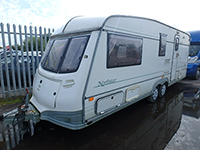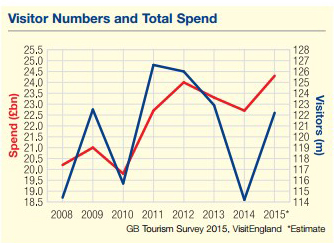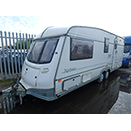 Caravan culture is probably something that a lot of people associate with their childhood holidays. After their initial hype back in the mid to late 20th century, caravan holidays declined and more people opted for alternative options such as staying in local hotels or heading abroad on holiday.
Caravan culture is probably something that a lot of people associate with their childhood holidays. After their initial hype back in the mid to late 20th century, caravan holidays declined and more people opted for alternative options such as staying in local hotels or heading abroad on holiday.
In recent years there has been a significant change in the economic climate and additional factors such as school holiday restrictions and increasing prices has led people to pursue more cost effective options for their family holiday. As a result, there has been a growth in domestic tourism (figure below) which has created an increasing demand for both caravans and recreational vehicles (RVs).
 (Domestic tourism numbers – Tourism Alliance, 2016)
(Domestic tourism numbers – Tourism Alliance, 2016)
What’s the difference between a caravan and an RV?
Caravan
A caravans is typically described as a smaller unit which is equipped for living in and will usually be towed by a car. Vehicles like this will be compact and will usually not include a bathroom.
RV
An RV on the other hand is much larger in size and will include a large living space and possible a bathroom, this is a motorised vehicle unlike the caravan and will therefore not need to be towed.
Why would caravans or RVs appeal to your customers?
- Appeal to a wide range – these types of vehicles are now used for a variety of reasons such as UK family holidays and even for music festivals around the country
- It can be sold as a source of income – these vehicles not only provide a holiday option, but also a source of income to your customer who might decide to rent this to other people throughout the year for their holidays
- It will save customers a large amount of stress as the caravan/RV is just on hand when they are ready to go, no more airports or stressful bus journeys.
Take a look at our range of caravans and RVs now.
References
Tourism Alliance (2016) UK Tourism Statistics , London: Tourism Alliance.

 Caravan culture is probably something that a lot of people associate with their childhood holidays. After their initial hype back in the mid to late 20th century, caravan holidays declined and more people opted for alternative options such as staying in local hotels or heading abroad on holiday.
Caravan culture is probably something that a lot of people associate with their childhood holidays. After their initial hype back in the mid to late 20th century, caravan holidays declined and more people opted for alternative options such as staying in local hotels or heading abroad on holiday. (Domestic tourism numbers – Tourism Alliance, 2016)
(Domestic tourism numbers – Tourism Alliance, 2016)